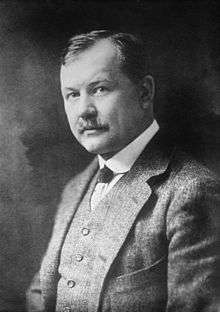Der Zarewitsch
| Franz Lehár |
|---|
 |
|
Operas
|
Der Zarewitsch (The Tsarevich) is an operetta in three acts by Franz Lehár. The German libretto by Heinz Reichert and Béla Jenbach is based on the play of the same name by Polish author Gabriela Zapolska. One of his later operettas, Lehár composed the work as a vehicle for Richard Tauber, the acclaimed Austrian tenor. The work received its first performance at the Deutsches Künstlertheater in Berlin on 21 February 1927, with Tauber and Rita Georg in the leading roles.
Roles
| Role | Voice type | Premiere Cast, 21 February 1927.[1] (Conductor: - ) |
|---|---|---|
| Tsarevich | tenor | Richard Tauber |
| Iwan, a valet | baritone | Paul Heidemann |
| Mascha, Iwan's wife | soprano | Charlotte Ander |
| Sonja | soprano | Rita Georg |
| Lina | soprano | |
| The First Minister | bass | |
| Master of ceremonies | bass | |
| Grand Duke | spoken | |
Synopsis

The plot of Der Zarewitsch is loosely based on a true story: the self-imposed exile of the son of Peter the Great, Alexei, who shirked his father's command to become a monk or take interest in the military by running away to his brother-in-law's kingdom, the Holy Roman Empire, with his Finnish mistress disguised as a page. The couple spent two years in hiding until Alexei was compelled by his father to return. His father was paranoid that Alexei was conspiring against him and ultimately Alexei ended up being imprisoned and tortured. The Russian senate convicted him of conspiring against his father and he was sentenced to death. He died due to ill health before he could be executed, most likely resulting from the poor treatment he received while imprisoned.
Reichert's libretto differs on several points from the life of Alexei. First, he changed the story so that the young girl, Sonja, is first seen disguised as a male Circassian dancer. When the Tsarevich runs away with Sonja he believes that she is a boy adding what Richard Traubner of Opera News called an "underlying homosexual frisson" to the operetta. Eventually the young prince discovers that Sonja is in fact a girl disguised as a boy. The two fall in love and escape to Naples. A further major difference is that the operetta does not have such a tragic ending, though it is not exactly happy either. Eventually the Zarewitsch learns that his father has died and he knows his relationship can not continue with Sonja as he is now the Tsar. The operetta ends with a "bittersweet royal–commoner parting".
Famous arias
- Es steht ein Soldat am Wolgastrand (A soldier stands on the bank of the Volga)
- Duet: Dich nur allein, nenn' ich mein (You alone take I for mine)
- Einer wird kommen (Someone will come)
- Volga song: Allein, wieder allein (Alone, again alone)
- Willst du? (Do you want to?)
- Duet: Warum hat jeder Frühling, ach, nur einen Mai (Why does every spring have only one May?)
Recordings
In 1927, Richard Tauber recorded the two principal arias, and two duets with his first wife, Carlotta Vanconti, for Odeon. Vanconti had taken over the role of Sonja from its creator, Rita Georg, on tour and later sang it in Berlin.
A 1968 complete recording with Rita Streich (soprano) and Nicolai Gedda (tenor), the Graunke Symphony Orchestra, choir of the Bavarian State Opera, and the Tchaika Balalaika Ensemble conducted by Willy Mattes - German Electrola (EMI).
In 1972, it was produced for television by Unitel under the direction of Austrian Arthur Maria Rabenalt (who also directed its 1954 TV staging) and featuring cinematography by Heinz Pehlke[2] The 1972 TV production starred Wieslaw Ochman in the title role and Teresa Stratas as Sonja. In 1973, it was issued on VHS cassettes, and in 2007 for the first time on DVD, in collaboration between Deutsche Grammophon and Unitel.
References
Notes
- ↑ According to the Amadeus Almanac the premiere was on 21 February 1927.
- ↑ "Der Zarewitsch" filmportal.de Retrieved March 12, 2012.
Sources
- Amadeus Almanac Accessed 26 October 2008
- Lamb, Andrew, Der Zarewitsch, The New Grove Dictionary of Opera, ed. Stanley Sadie (London, 1992) ISBN 0-333-73432-7
- "Lehár: Der Zarewitsch", Opera News, July 2009 , vol 74 , no.1